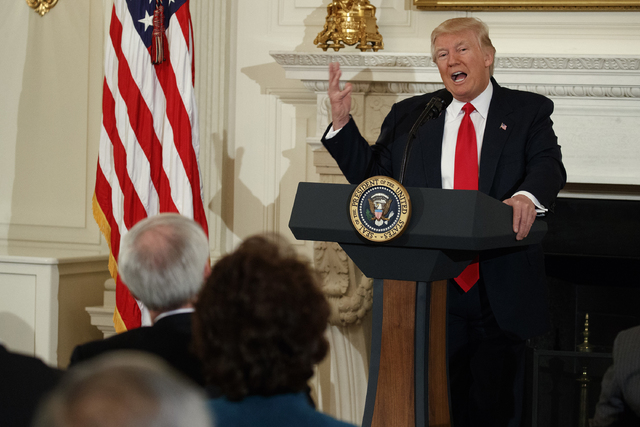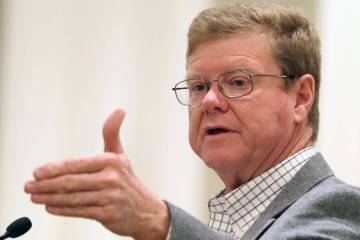‘Nobody knew health care could be so complicated,’ Trump tells governors
WASHINGTON — President Donald Trump told the nation’s governors Monday that “nobody knew health care could be so complicated” as Republicans in Congress and the administration continued to grapple with repeal and replacement of the Affordable Care Act.
Trump met with the governors on the final day of their three-day annual conference amid concerns that states could be stuck with increased costs if Congress repeals the health care act without replacing it with another plan to provide coverage and funds for expanded Medicaid coverage.
“It’s still a work in progress,” Nevada Gov. Brian Sandoval, a Republican and vice chairman of the National Governors Association, said of the effort to craft a replacement.
Nevada expanded Medicaid under the health care act that was signed into law by former President Barack Obama and dubbed Obamacare by congressional Republicans who have vowed to repeal it.
About 32 million people receive their health care through insurance exchanges created under the health care act or Medicaid expansion in states that opted in under a provision of the law, according to the Urban Institute.
MEDICAID COVERAGE A CONCERN
Sandoval said about 300,000 people in Nevada are covered under the Medicaid expansion.
“I want to make sure those people maintain coverage,” he said at a news conference at the Dirksen Senate Office Building on Capitol Hill.
Earlier, Trump admitted there are challenges ahead, but he vowed to work with congressional leaders to surmount them.
“Obamacare has been a disaster, and it’s only getting worse,” Trump said.
The president also met with the heads of major health insurance providers at the White House Monday and told them that he had asked Health and Human Services Secretary Tom Price to work with them to stabilize markets and create a new plan.
“The new plan will be a great plan for the patients, for the people and hopefully for the companies,” Trump said.
But the White House has yet to release details on a replacement plan or throw its support behind various replacement proposals being floated on Capitol Hill by Republican lawmakers.
Those plans include a variety of mechanisms to fund health insurance coverage and the expansion of coverage under Medicaid, the health care program for the nation’s elderly and poor.
Virginia Gov. Terry McAuliffe, a Democrat and the chairman of the governors association, said plans to fund Medicaid expansion through new block grants would be a nonstarter for many states.
McAuliffe said block grants would save the federal government and likely push the expense to states, most of which expanded Medicaid to take advantage of federal funds offered to help cover the most needy of populations.
Sandoval said a payment mechanism through per-capita grants to the states also could be problematic. He said federal benchmarks on population would have to be up to date to reflect the fact that Nevada is one of the fastest-growing states in the U.S.
A benchmark three years old, Sandoval said, “would penalize my state.”
McAuliffe said an analysis by a health research and consulting firm presented to the governors showed that changing the funding mechanism could have a huge financial impact on some states and result in decreased coverage.
But Utah Gov. Gary Herbert, a Republican, said his state, with a younger population, could fare better under a block grant system for Medicaid or changes that give tax credits based on income instead of age.
Herbert said that, with the current system, there is a concern about sustainability. He said what is good for Arizona, with its large retirement population, would not be good for Utah.
SANDOVAL ENCOURAGED BY DIALOGUE
Despite the divisions in the GOP, Sandoval said he was encouraged that lawmakers were talking with governors about replacement plans and that continuing care is part of the discussion.
Just recently, McAuliffe said, “We were worried about straight out repeal.”
The ACA bill passed the House and Senate in 2010 on a strict party vote, with no GOP lawmakers supporting the legislation.
Senate Minority Leader Charles Schumer, D-N.Y., told the National Press Club on Monday that Republican attempts to repeal the bill could face opposition from their own party.
Schumer said it is uncertain Republicans even have the votes in the Senate to repeal the law.
Republicans hold a slim 52-48 majority in the Senate. If they settle on a replacement that strips funding for Planned Parenthood or keeps a tax on generous health plans offered by businesses and unions similar to one imposed by the ACA, that could cost GOP votes, he said.
U.S. Sen. Dean Heller, R-Nev., is leading a bipartisan effort in the Senate to repeal the so-called “Cadillac tax” in the Obamacare legislation. That tax, which is scheduled to take effect in 2020, has drawn opposition from Republicans and Democrats alike.
But Schumer said Republicans may come to favor a replacement plan that includes such a tax as a way of keeping more Americans insured, which would in turn cost them support from the GOP’s fiscal conservatives.
Contact Gary Martin at 202-662-7390 or gmartin@reviewjournal.com. Follow @garymartindc on Twitter.
President meets with state leaders, including Gov. Sandoval of Nevada, to update them on plan to repeal and replace Obamacare and hear their concerns.




























